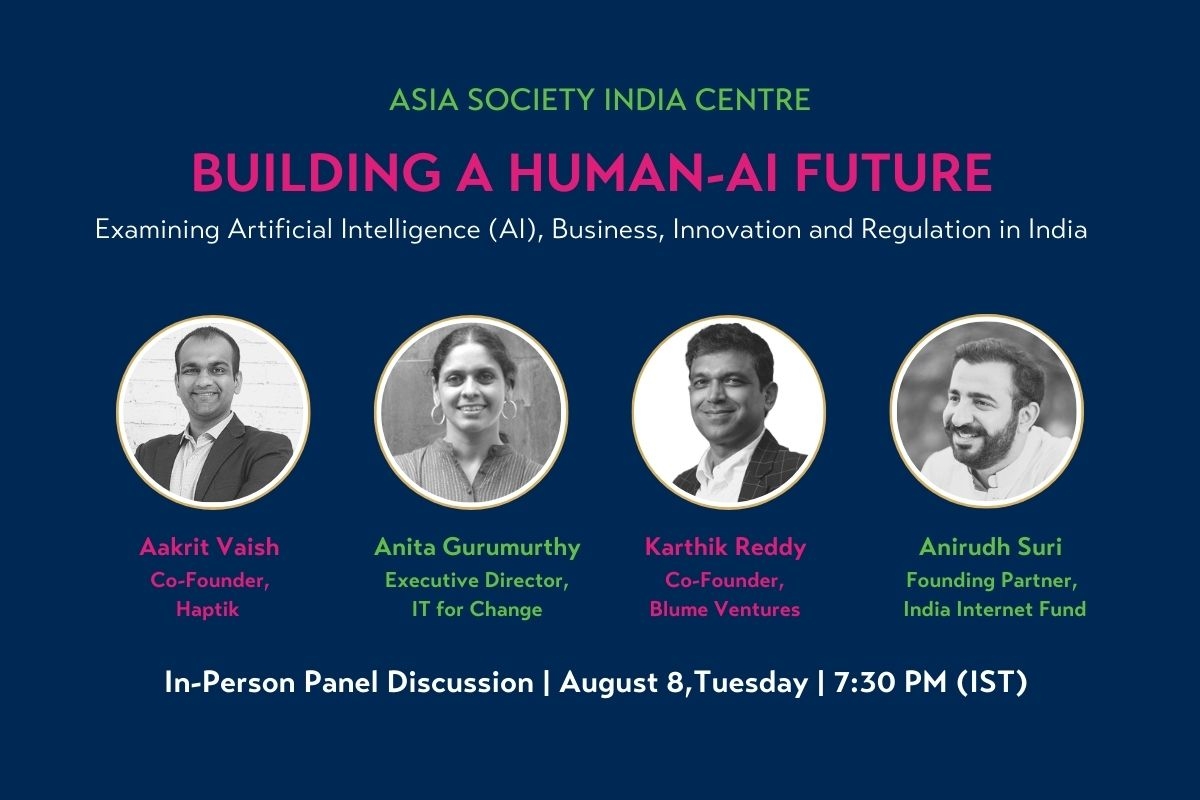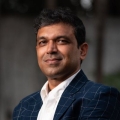Building a Human-AI Future
VIEW EVENT DETAILSA Panel Examining Artificial Intelligence (AI), business, innovation and regulation in India

Technology has been powering businesses for many years now -- from the earliest computers and mechanized production to cloud computing and artificial intelligence, engineers and computer scientists have built inventive and research-driven solutions for human work and life. Artificial intelligence – loosely defined as a set of technologies that make human work easier, often by replicating human behaviour – has reached a particularly important point now, in 2023. With the Microsoft-funded Open AI coming out with an artificial intelligence chatbot ChatGPT, laypeople and end-consumers have been able to see how interactive and unique conversations with AI have gotten, and how far technology has come.
The field of AI is particularly relevant in the Indian context now. It is no longer just technology companies using AI in India, but also banking and financial services; manufacturing; infrastructure; and retail. Vani Kola, the founder of Kalaari Capital, talks about the global shift from simpler technology-assisted tasks (execute a specific task, without expanding that scope; perform repetitive tasks like driving faster than humans) - to generative intelligence, where AI models can reason and improve as humans do. Similarly, Goldman Sachs research found that despite “significant uncertainty” about the potential of generative AI, “its ability to generate content that is indistinguishable from human-created output and to break down communication barriers between humans and machines reflects a major advancement with potentially large macroeconomic effects.”
In the 1960s, the American poet Richard Brautigan dreamt of a technological utopia where machines and artificial intelligence eased human life in straightforward ways. We would be content and 'watched over by machines of loving grace', an idealism that seems out of our reach now. As powerful as artificial intelligence is, the technologists behind it are often caught in controversy for not considering personal safety: OpenAI has been questioned for leaking users’ information, for example, or not being transparent with how data is used. Regulation is taking precedence the world over: in 2022, 127 countries passed legislation to regulate AI and hold its makers accountable. In India, a digital personal data protection bill is being discussed in Parliament, so that the government can regulate companies’ use of AI to keep “users safe from harm.” In addition to privacy risks, AI tends to be rife with other biases – false arrests, discrimination in offering healthcare services, and surveillance that disproportionately affects socioeconomically marginalised groups. When we program AI, therefore, we need to think about how we can make the digital world as equal as we want to make the tangible world.
How is AI is transforming the face and future of lives and work in India, an emerging hub of technology? What are the potential gains and pitfalls of AI for Indian businesses? How do we move forward while keeping compassion and consideration at the centre of a human-and-AI world? To explore these questions, join us for a panel discussion with Aakrit Vaish, co-founder and CEO, Haptik; Anita Gurumurthy, executive director, IT for Change; Karthik Reddy, co-founder, Blume Ventures, and Anirudh Suri, founding partner, India Internet Fund and author, ‘The Great Tech Game: Shaping Geopolitics and the Destiny of Nations.’

Anita Gurumurthy is a founding member and executive director of IT for Change where she leads research and advocacy on data and AI governance, platform regulation, and feminist frameworks on digital justice. Anita contributes regularly to academic and media spaces. She serves as an expert on various bodies including the United Nations Secretary-General’s 10-Member Group on Technology Facilitation and the Council of the Platform Cooperativism Consortium at The New School – New York. She has been on the Paris Peace Forum’s working group on algorithmic governance. Anita is also a board member of global justice organizations such as the ETC Group and Focus on the Global South, and university centers such as the Minderoo Tech & Policy Lab at the University of Western Australia, and International Development and Social Change program of Loughborough University.

Aakrit Vaish is the Co-founder & CEO of Haptik, a pioneer in the conversational AI industry. The platform processes more than 2 billion interactions annually and is now one of the top 5 globally. Haptik's AI chatbot was responsible for powering India's official WhatsApp COVID-19 helpline used by more than 50 million citizens, as well as Jio Mart on WhatsApp, the world's first end-to-end conversational commerce solution. Aakrit is an angel investor in more than 80 startups In India, and is the founder of the Tech Entrepreneurs Association of Mumbai (TEAM), a non-profit organization consisting of Mumbai's leading companies with a mission to advance the city's startup ecosystem. Aakrit has been nominated to lists including Forbes India's 30 Under 30, Entrepreneur 35 under 35 and Business World 40 under 40. In 2023, Aakrit has been selected as a World Economic Forum Young Global Leader (YGL).

Karthik Reddy co-founded Blume Ventures in 2011, along with Sanjay Nath. He has shaped Blume’s investment approach and philosophy over the years, and in turn has overseen investments in some of Blume’s leading portfolio companies such as Servify, Belong, Exotel, Grey Orange Robotics, Unacademy, HealthifyMe and Railyatri. Karthik’s stints at American Express, Reuters Instinet and The Times of India Group have given him a breadth of experience across the US and India in financial markets, technology and media. He is an alumnus of IIT Roorkee, IIM Bangalore and the Wharton School at the University of Pennsylvania.

Anirudh Suri is a venture capitalist, technology entrepreneur and policy advisor. His interests lie at the intersection of climate, technology and geopolitics, and he is committed to helping India and Indian startups cement their space in the global tech ecosystem. He is currently the Managing Partner at India Internet Fund, a technology-focused venture capital fund based in India and the U.S. Previously, he has worked with the government of India in Delhi; McKinsey and Company in New York; the Carnegie Endowment for International Peace in Washington DC; and Goldman Sachs in London. He is the author of ‘The Great Tech Game’ (HarperCollins, 2022). He has written extensively on foreign policy, geopolitics, national security, technology and entrepreneurship in publications such as the Indian Express, The Seminar, Hindustan Times, Foreign Policy, The New Republic, and Asia Times. He also served as the Founding Editor for the Carnegie Endowment’s journal on South Asia, South Asian Perspectives.
Event Details
Rendezvous, Taj Mahal Hotel
Gates close at 7:20 pm IST
